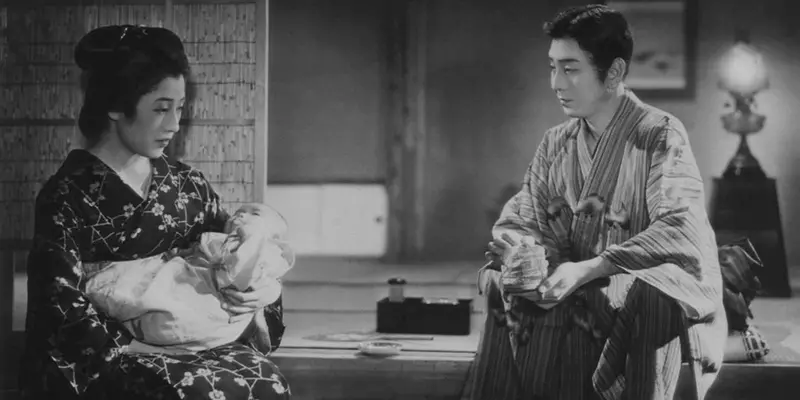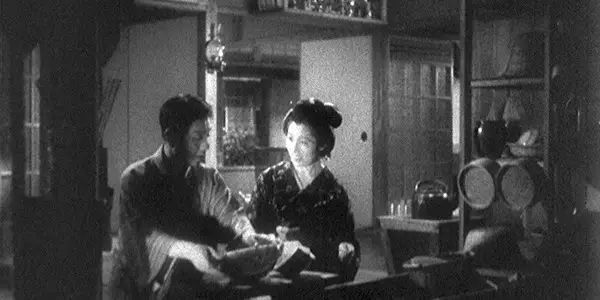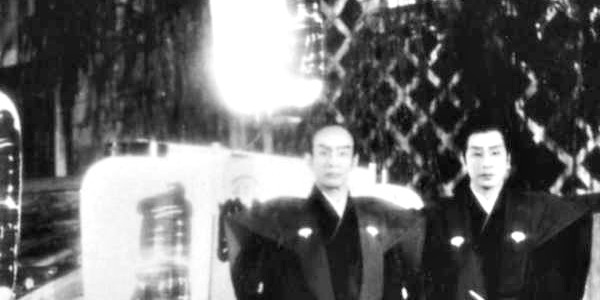THE STORY OF THE LAST CHRYSANTHEMUM: A Devastating Cycle Of Sacrifice

Ben is a former student of cognitive science who is…
Kenji Mizoguchi’s The Story of the Last Chrysanthemum follows Kikunosuke and Otoku, a young couple in late 19th Century Japan. Kikunosuke is the adopted son of a famous kabuki house, and an emerging kabuki actor; Otoku is one of his family’s servants. Most people, including his adopted father, think Kikunosuke is no good as an actor, but they only criticize him behind his back. Even though no one ever tells him to his face, Kikunosuke can tell that something isn’t quite right. Eventually, Otoku – without any hostility – tells him the truth. He appreciates this, and they fall in love.
Despite this, it almost feels wrong to call The Story of the Last Chrysanthemum a romance, when it’s every bit as much a grim tragedy. Because of their relationship, Kikunosuke and Otoku are chastised by the people they know and forced out of their old lives, losing all stability. The world bears down on them ruthlessly, determined to make them cogs in its machine or, failing that, destroy them completely.
Depth and Chaos
The film’s world comes to life in its large, incredibly detailed sets, its use of deep focus, and its complex camera movement. In some ways, it’s freeing to take on the camera’s eye as it drifts through such an elaborate and populous world. But when we see Kikunosuke and Otoku pass through it, always at a fair distance from the camera, it seems more like a chaotic labyrinth. The private spaces that offer them relief and security shrink over the course of the film; they begin their relationship in a well-kept house that they have all to themselves, yet they end up with no recourse but to huddle up against a public wall with a blanket as their only barrier from the rest of the world.

Early in the film, people badmouthing Kikunosuke without his knowledge are shot through obstructions, capturing not only the clandestine nature of their criticisms, but also how deeply rooted social performance is in the high society this film depicts. At the same time, Kikunosuke and Otoku’s inability to live up to that manifests not only as a destruction of personal space, but as unbearable tension engendered by creative camera angles and foreboding shadows.
It’s worth noting that Kikunosuke doesn’t even seem that interested in improving his acting. Though his relationship with Otoku begins with her offering him honest criticism, she ultimately helps him the most by giving him the emotional support he needs to persevere with trying to improve. At one point, he intimates that he might give up acting; Otoku persuades him to go on with it.
Failings of Freedom
One of the most recognized hallmarks of Mizoguchi’s films is the theme of women having less freedom than men, and having burdens foisted off on them as a result. In films like Mizoguchi’s Ugetsu, this manifests as women making sacrifices for men, and the men only realizing the price paid on their behalf after some crisis has already taken place.
This is more or less the case in The Story of the Last Chrysanthemum as well, but there’s no moment that can be singled out as a crisis. Rather, Kikunosuke and Otoku remain together throughout the movie, and they suffer because they’re together. Most of the weight falls on Otoku when she tries to keep Kikunosuke’s spirits up. The film says nothing explicit against the fact that the world they live in has consigned them to this fate. But it’s enough to see how utterly tragic it is: it’s unbearable to think that things had to be the way they are in this film.

The gap in freedom between Kikunosuke and Otoku is visible both in the compositions (in how they move through the convolutions in the film’s settings), and the performances. Shotaro Hanayagi‘s performance as Kikunosuke is restrained, but also runs a full gamut of emotional states, often with a layer of naïve frustration over it. Kakuko Mori, meanwhile, gives an equally great but much less varied performance as Otoku, who keeps her emotions muted for the sake of keeping herself and Kikunosuke afloat.
What exactly to take away from the end of The Story of the Last Chrysanthemum will probably depend on the viewer. But the way I see it, it ends back where it began – in a particularly cruel way. The only things preserved when Kikunosuke and Otoku’s story comes full circle are the sources of their suffering. Even if the film doesn’t hold anyone at fault, its final notes refuse to let go of the loss that it took to reach them.
To Conclude
The Story of the Last Chrysanthemum, for its length and for its rawness, can be a difficult film to watch. But its richness of detail evokes life to a degree that few films can match. It’s the rare film that genuinely feels like it was made in an era before film was even invented, and its depiction of that era is stunningly immediate. It’s that immediacy, the ability to dwell in its world, that makes it more than just an exercise in miserablism, even if it is uncompromisingly dour; as sad as Kikunosuke and Otoku’s fate is, it’s intrinsically related to the fact that they reside in a living world.
Do you find The Story of the Last Chrysanthemum‘ ending bittersweet or grimly tragic? How do you find you usually feel when a story comes full circle?
The Story of the Last Chrysanthemum is available on Blu-ray and DVD from the Criterion Collection as of September 13, 2016. It is also available for streaming on Hulu Plus and Amazon Instant Video.
Does content like this matter to you?
Become a Member and support film journalism. Unlock access to all of Film Inquiry`s great articles. Join a community of like-minded readers who are passionate about cinema - get access to our private members Network, give back to independent filmmakers, and more.
Ben is a former student of cognitive science who is currently trying to improve his writing style and ability to understand and appreciate films containing unfamiliar perspectives. He tries not to hold films to a strict set of criteria, but does believe that strong movies can change your outlook on the world. His favorite films include Whisper of the Heart, Hellzapoppin', Foolish Wives, 42nd Street, and the work of Charlie Chaplin.













